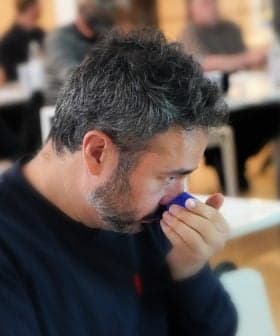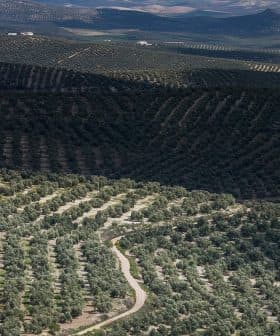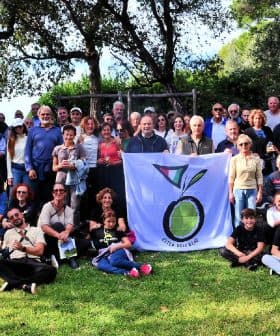Collegiate Cross-Country Champions Use Olive Oil to Fight the Cold

Edward Eyestone, a two-time Olympian and Brigham Young University coach, applied olive oil to his athletes’ arms, backs, and legs before the 2024 NCAA Division I cross-country championships, leading to his teams being crowned champions. Eyestone believes that olive oil can enhance athletes’ performance in various conditions and has a long-standing tradition in sports, dating back to Ancient Greece and continuing in modern events like Turkey’s olive oil wrestling tournament. The exact mechanism by which olive oil benefits athletes remains unclear, but Eyestone believes it helps insulate the skin and bridge the gap between removing warm-up clothing and generating warmth during the race.
Olive oil may have played a pivotal role at the 2024 National Collegiate Athletic Association (NCAA) Division I cross-country championships in Verona, Wisconsin.
Alongside his colleagues, two-time Olympian and Brigham Young University (BYU) coach Edward Eyestone applied olive oil to his athletes’ arms, backs and legs after they removed their pre-race warm-up clothes and were preparing to race.
The thin layer of olive oil provides some insulation against heat loss from the warm skin to the cold air.
Eyestone believes olive oil can make a difference when race time temperatures hover above freezing. His convictions were repaid as the BYU men’s and women’s cross-country teams were crowned champions.
While using olive oil this way is not new for the coach, he said it is reserved for special occasions. “We only break the olive oil out for the big races at the end of the year,” he told Olive Oil Times.
See Also:Yusuf Can Zeybek Repeats Kırkpınar Triumph“In the States, the big races usually coincide with late fall when the conditions are getting more extreme. And my guys usually run well late in the season,” Eyestone said.
The coach believes olive oil may enhance athletes’ performance in various conditions. “I have only done this before cross-country races, but there’s no reason why it wouldn’t work for a 5k [five-kilometer] or 10k [ten-kilometer] race,” Eyeston said.
“For anything much longer than 30 minutes, I’d be concerned that the olive oil would gradually cool to the outside temperature,” he added. “In such cases, I’d probably opt for more traditional options like tights, arm sleeves, or longer shirts. And, of course, in extreme conditions, wear multiple layers.”
The association of the olive tree with sports has a long-standing tradition, dating back to the Olympic Games in Ancient Greece.
“Before athletic practice, the athletes would anoint their bodies with olive oil to prepare their skin,” Anna Gustafsson, a Finnish archaeologist and writer based in Athens, told Olive Oil Times in an August 2024 interview. “They also cleaned themselves after sweating by rubbing their skin with a mixture of olive oil and sand and then scraping the dirt off.”
In modern times, athletes participating in Turkey’s annual Kırkpınar olive oil wrestling tournament use an estimated two metric tons of olive oil.
Combatants ritualistically cover themselves and their opponents in olive oil, which makes it very difficult for the wrestlers to grip each other, forcing them to grab their opponent’s pockets. Wrestlers also claim that olive oil reduces pain from injuries and helps their wounds heal faster.
“Olive oil use is very old school,” Eyestone said. “When I was a high school runner in the late 1970s, I first used it.”
“I believe I can trace it back to either my father, who used it at the University of Idaho while running cross-country in the 1940s, or my high school coach, who used it with our team,” he added. “Since he was from Canada, he knew a thing or two about cold conditions.”
Various lubricating fats have been used on the skin as a protective layer in modern times.
“I think swimmers crossing the English Channel have tried similar methods by coating themselves with Vaseline or lard,” Eyestone said.
“Cross-country skiers in very cold conditions are also known to use Vaseline on exposed skin. Olive oil is just a thinner version of the Vaseline technique,” he added.

“This photo from winter nationals in 1993 shows me running on the left, with a frozen mustache but a slight shine from the olive oil on my legs and face. The temperature was 7 ºF (-14 ºC),” Eyestone said.
Olive oil contains numerous components, including antioxidants and vitamins, that are ideal for skin care. Thanks to its polyphenols, olive oil can also help the skin recover from damage.
Still, the coach admitted that the exact mechanism by which olive oil benefits BYU runners remains unclear.
“One of my athletes is a mechanical engineering major, and his professor, upon hearing about our use of olive oil, suggested it was probably marginally useful due to heat transference principles,” Eyestone said.
“The thin layer of olive oil provides some insulation against heat loss from the warm skin to the cold air,” he added. “Thanks to the viscosity of the olive oil, a thin layer of air may also be trapped between the skin and the oil.”
Eyestone explained that the coaching staff warms the olive oil slightly using heaters, “which creates a cozy, blanket-like sensation when first applied,” he said.
“Ultimately, I feel that the olive oil helps bridge the gap between removing outer warm-up clothing and the warmth the body generates during the race,” Eyestone added. “And instead of needing to remove arm sleeves or an extra shirt during the race, you’re already free of those layers and can focus on running.”
As a long-time user of olive oil in races, Eyestone reflected on how it has helped him in some of the harshest conditions he has encountered. “I’ve used olive oil in temperatures ranging from the high 30s to as low as 5 ºF (-15 ºC),” he said.









